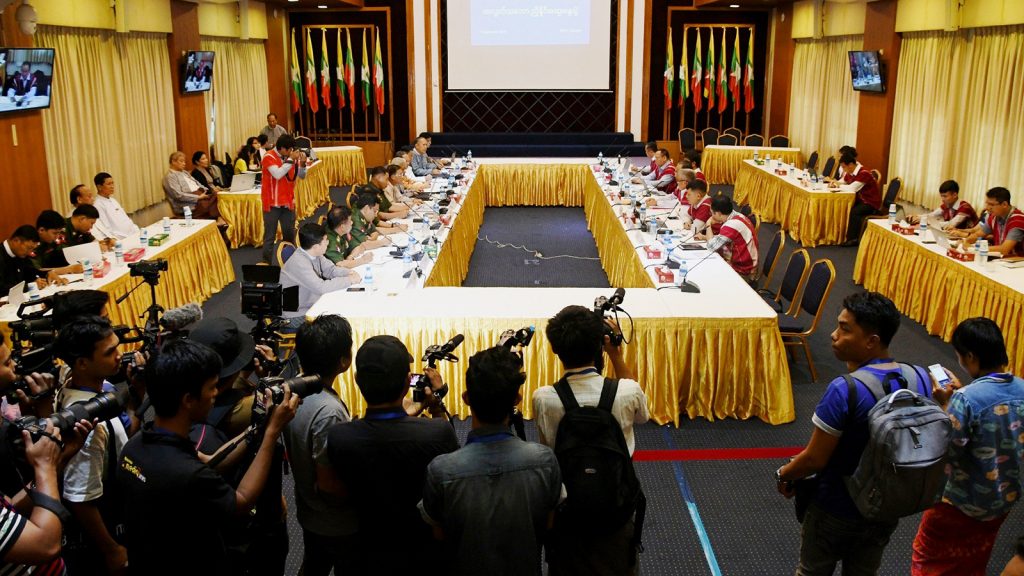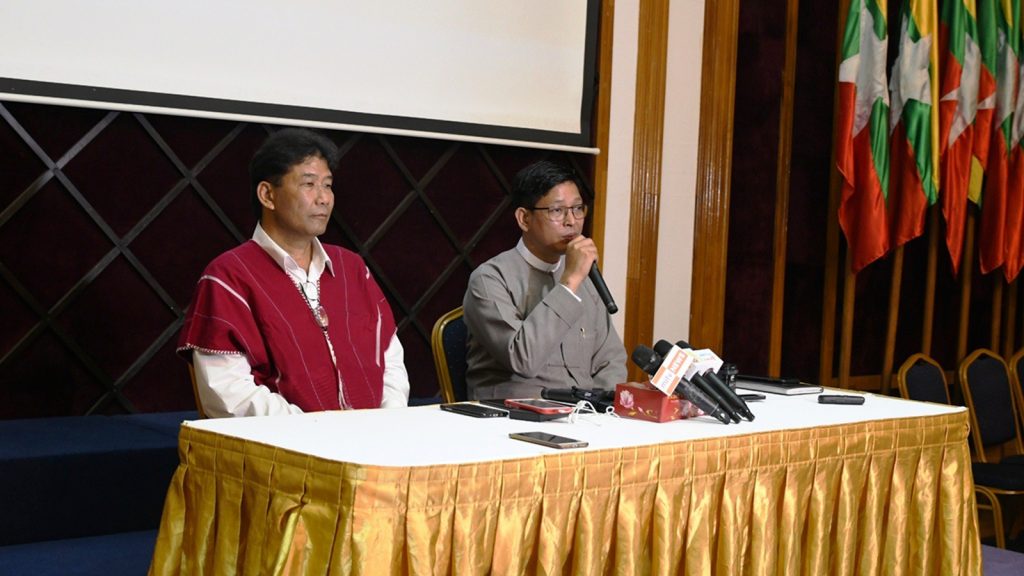8 September
Representatives of the National Reconciliation and Peace Centre (NRPC) and the Karen National Union (KNU) held an informal meeting on peace process works at NRPC in Yangon yesterday morning.
In addressing the meeting NRPC Vice Chairman Union Attorney General U Tun Tun Oo said that after the third session of the Union Peace Conference – 21st Century Panglong the government had been meeting continuously with Ethnic Armed Organizations (EAOs) that had signed the NCA (Nationwide Ceasefire Agreement) to discuss future peace work processes. This was the tenth meeting with the KNU. The government has been striving towards a union that was based on democracy and federal system that has assurance of democracy, national equality and rights of self-determination.
In doing this a common agreement of NCA was taken as a main pillar. We all expected the path toward establishing a future democracy federal union would not be smooth or easy. We all accepted the fact that political discussions at the table was the only way to resolve the issue that was unresolvable by the long running armed conflict. The differences between us were resolved through negotiations and discussions resulting in achieving the NCA, Union Accord Part 1 and Union Accord Part 2. We were able to accomplish things that we thought were not possible and difficult.
Political discussions and practical implementation process for ceasefire were done through mutual agreement.
The Union Government conducted an overview of inconveniences caused due to various reasons and proposed four future processes. These were works to be conducted according to the NCA, acquiring basic federal principles in union peace process, step by step works to be conducted by the government and ethnic armed organizations (EAOs) in post and pre 2020 periods and establishing and implementing projects that would allow the result of peace to be prevailed in ethnic regions.
As our peace process was based on the NCA, future work processes must not deviate from the NCA path. It should be noted that the government had proposed four future processes centered on the NCA. It was hoped that the day’s meeting would create positive outcomes and all are urged to openly discuss, find solution for difficulties faced, establish trust and reach agreements, said the Union Attorney General.
On August 20, peace commission representative group and representative group led by KNU Vice Chairman met in Chiang Mai, Thailand, to discuss reconvening of the 21st Century Panglong Conference that had not been held for more than a year and finding solution on matters in which the two sides were differing. The day’s meeting was to discuss acquiring positive thoughts based on the good outcomes of that meeting, said the Union Attorney General.
In his remark delivered at the meeting KNU Vice Chairman said this was the third time KNU, government, Tatmadaw and Hluttaw representatives were discussing after holding the third session of 21st Century Panglong. It was to strengthen the successful implementation of the NCA as agreed. Understandings and similarities were getting closer after each discussion. Today’s meeting was to implement successfully and achieve progress in implementing the NCA.
There were two main agreed points in implementing the NCA. First was to strengthen the ceasefire based on the agreement. Second was political. We have faced armed conflicts ever since we gained independence. That was why the NCA was being implemented. The NCA has been accepted as an agreement that is the main pillar for peace in our country, for reconciliation of ethnic people and for our country’s development.
Today’s meeting will cover matters to be conducted politically and militarily. Leaders from both sides in this meeting include those that had been participating in the peace process since the beginning. There were difficulties. But through mutual trust we have overcome obstacles and challenges and reached this stage. All had the duty to strive towards achieving stages beyond this stage. Our views were not the same. But we believe that we can find an acceptable answer that is acceptable to both sides. Our discussions, thoughts and views may be different but we were working towards how to reach an agreement through discussions. We hope to achieve progress and success in the peace process that was being implemented.
The meeting was attended by NRPC representatives consisting of NRPC Vice Chairman Union Attorney General U Tun Tun Oo, NRPC members Lt-Gen Yar Pyae, Lt-Gen Min Naung, NRPC secretary Lt-Gen (retired) Khin Zaw Oo, Maj-Gen Soe Naing and Maj-Gen Nay Lin from Commander-in-Chief (Army) Office, Pyithu Hluttaw representative U Pyone Cho, Office of the President advisor U Paw Lwin Sein, NRPC advisory group member U Hla Maung Shwe, U Moe Zaw Oo and Director General U Zaw Htay from the Ministry of Office of the State Counsellor.
KNU representatives attending the meeting were KNU Vice Chairman Padoh Saw Kwe Htoo Win, KNU General Secretary Padoh Saw Tado Moo, and KNU permanent central committee members.
The meeting came to a close after KNU Vice Chairman Padoh Saw Kwe Htoo Win and NRPC Vice Chairman Union Attorney General U Tun Tun Oo had delivered closing speeches.
After the meeting KNU General Secretary Padoh Saw Tado Moo and Director General U Zaw Htay met with the media. They explained about the day’s meeting, future peace process works and responded to questions raised by the media.— Ye Khaung Nyunt (Translated by Zaw Min)



